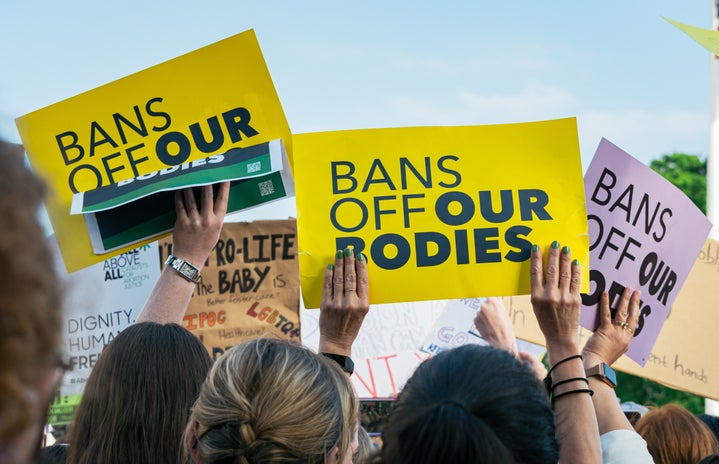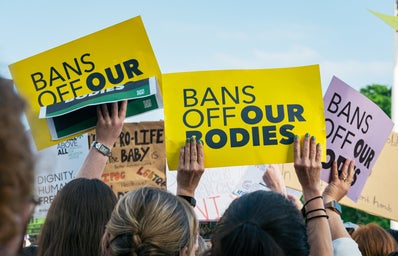For five decades, Americans have passionately (and at times, callously) debated over a woman’s right to choose. according to a 2017 study from the Guttmacher Institute, home of groundbreaking reproductive health research, In the United States, approximately one in four women have had an abortion. In the realm of human sexuality, a stark and pervasive double standard has long prevailed. Women cannot and never have been able to express themselves sexually in the ways that men do. Historically, cultural norms have endorsed and even celebrated male sexual agency and exploration while harshly scrutinizing, stigmatizing, and shaming women for doing the same. This disparity is rooted in the deep-seated patriarchal structures that persistently reinforce traditional gender roles, creating the parameters of what is and isn’t acceptable behavior.
The issue extends beyond individual relationships and private experiences as the realm of reproductive rights, where abortion, a deeply personal and often difficult decision, becomes yet another battleground for the enforcement of gender-based double standards. Abortion, a procedure related to sexual autonomy and women’s control over their bodies, is marked by societal stigma and shaming that is fundamentally misogynistic in nature. The centuries-old narrative surrounding abortion, shaped predominantly by patriarchal institutions, has perpetuated the belief that a woman’s reproductive choices should be subject to external control and moral judgment, leading to the marginalization and victimization of women seeking reproductive healthcare. This narrative, deeply ingrained in cultural consciousness, underscores the pressing need for broader dialogue and critical examination of the gender disparities that persist in how society views and treats sexual expression and reproductive autonomy.
Women absolutely deserve the right to choose abortion as an integral component of their reproductive autonomy. This right encompasses the freedom to make decisions about their own bodies, health, and future, free from judgment and shame. Abortion is a deeply personal and often complex choice, influenced by numerous factors such as health, financial stability, personal circumstances, and individual beliefs. Upholding this right means fostering an environment where women are empowered to make the best choice for their unique situations, free from societal stigma.
Names and ages have been altered slightly to encourage vulnerability and honesty, while upholding safety and privacy for these young women.
Jasmine, 23
“I was so scared. Like to this day, if I remember it, I can feel that scared feeling. People yelling at you while you put your head down and try not to cry—and mind you, my mom used to be one of those protesters too. I was scared someone out there would maybe know her and recognize me.
It was so uncomfortable being pregnant, like physically—everything hurt, and I couldn’t even consider telling my parents for like emotional support or anything. I was raised a Black Muslim, like, Malcolm X stuff—I don’t know if people will know what that means. She still doesn’t even know that I had my first kiss. I felt so dirty from like, the moment I found out. People always say they felt this immediate love from inside of themselves. It didn’t feel like there was anything inside of me to love. I had just turned 18 that year, in May… and then got dumped by my first boyfriend by July. I kept seeing him, because I thought if I went with the flow like he wanted me to, he’d see what he was missing. I was pregnant by August. I always tried to get pretty and look cute for class, take pictures…I couldn’t even stand to look at myself in the mirror while I was pregnant. I felt so stupid, like every mean thing my parents had ever said about me was right, and God was obviously punishing me for being a slut. Once it was over, it was like my body went right back to normal immediately, and I felt clean again. I didn’t tell anyone. It cost my whole check and my Dad was suspicious—I’m very good with money and I was randomly broke. My mind didn’t go back to normal though. My ex had found a new girlfriend and was posting her literally everywhere possible with the sweetest captions. I used to beg him to post me; he said that wasn’t really his style. When I sit here and think about how I could’ve had the baby of someone who would’ve never loved me, I mean—I can actually vomit right now picturing his face.”
ASHTYN, 34
“Things were different then…I felt like the reason the experience was so horrible from start to finish had to be because I deserved it. My friends kind of made it seem like it was my fault, so I shouldn’t have been sad, and just didn’t really create a safe space for that. I was really depressed and mopey after. They made jokes and basically told me to suck it up until I just stopped mentioning it completely, and then, you know, back then we didn’t have the social media thing we’ve got now, it was 2007. You just had your friends, so if your friends were being assholes about something you kind of took it more to heart—there wasn’t anywhere to run for emotional refuge. I carried that feeling for a long time. I didn’t truly accept my choice as natural and healthy until I was like 29. Until then, I was a bad person for having sex, a dumbass for getting caught, and I just…shame shame shame shame. Shame was the whole vibe. Being a teenage girl is the absolute trenches.”
In this moment in history, where it is risky for a woman to speak up for herself boldly—the public crucifixion of Megan Thee Stallion, the cartoonish villainization of Amber Heard still ringing in our ears—it is desperately vital to highlight the stories and voices of everyday women who made the brave decision to ignore the outside noise, and choose for themselves and the future they deserve.



